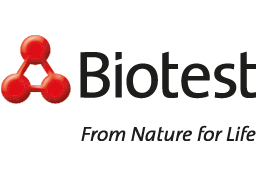Biotest AG: Clinical Study with Indatuximab Ravtansine (BT-062) in Multiple Myeloma shows good Tolerability and encouraging Efficacy in Combination with Lenalidomide and Dexamethasone
Biotest AG / Key word(s): Study / Clinical Study with Indatuximab Ravtansine (BT-062) in Multiple Myeloma shows good Tolerability and encouraging Efficacy in Combination with Lenalidomide and Dexamethasone. - Efficacy and tolerability data from combination therapy study 983 presented at 55th annual conference of the American Society of Hematology (ASH) - Good tolerability of combination therapy with indatuximab ravtansine (BT-062) at a dosage up to 100 mg/m2 - Clinical benefit seen in all evaluable patients - Complete response observed in individual patients - Response to treatment also achieved in patients refractory (resistant) to prior therapy with lenalidomide and dexamethasone - Study in solid tumors submitted to European authorities
New clinical data derived from an ongoing combination study with indatuximab ravtansine (BT-062) were discussed in an oral presentation at the 55th Annual meeting of the American Society of Hematology (ASH) in New Orleans. The phase I/IIa study (Study 983) is investigating the safety and efficacy of indatuximab ravtansine (BT-062) in combination with lenalidomide and dexamethasone in patients with relapsed (recurring) or relapsed/refractory (resistent) multiple myeloma. These data will be the basis for further clinical development of indatuximab ravtansine (BT-062) in multiple myeloma. In Study 983, to date 21 patients were treated with indatuximab ravtansine (BT-062) on days 1, 8, and 15 in combination with lenalidomide and dexamethasone in a 4-week cycle. Treatment cycles were repeated until progression of the underlying disease or occurrence of unacceptable toxicities. Preliminary efficacy evaluation from 15 patients across all dose levels reveals that 100 % of the heavily pretreated patients had clinical benefit from the therapy, achieving stable disease or better. Eleven of these patients achieved a partial up to a complete response, resulting in an objective response rate of 73%. - A comparable objective response rate of 75% was also obtained in a subgroup of patients who were refractory to prior therapy with lenalidomide and dexamethasone. - For eight out of nine evaluated patients treated at the MTD of 100 mg/m², partial response or better with an objective response rate of 89% was observed. At this phase II dose level of 100 mg/m² (MTD) a total of 37 patients will be treated to further evaluate the safety and efficacy in a larger number of patients. Moreover, Biotest submitted a phase I/IIa study (Study 989) in solid tumors to the European authorities. Triple negative metastatic breast and metastatic urinary bladder cancer were selected based on the convincing preclinical data and a comprehensive medical need analysis. The recruitment of patients into the study is planned for beginning of 2014. About indatuximab ravtansine (BT-062): Once the conjugate is internalized into the target cell, the DM4 is released from the targeting molecule, thereby restoring its original cytotoxic potency. This combination of high efficacy and specificity with low systemic toxicity sets indatuximab ravtansine About the Trial (Study No. 983) This phase I/IIa trial is designed to evaluate indatuximab ravtansine (BT-062) (administered days 1, 8 and 15, every 4 weeks) when used in combination with lenalidomide/dexamethasone to treat patients with relapsed or relapsed/refractory multiple myeloma. To qualify for enrollment, patients must have received at least one prior treatment regimen, which could include lenalidomide and/or dexamethasone. In the phase I part of the trial, patients were administered increasing doses of indatuximab ravtansine (BT-062) to determine its MTD when used in combination with lenalidomide and dexamethasone. In the Phase IIa part, indatuximab ravtansine Disclaimer This document contains forward-looking statements on overall economic development as well as on the business, earnings, financial and assets position of Biotest AG and its subsidiaries. These statements are based on current plans, estimates, forecasts and expectations of the company and are thus subject to risks and elements of uncertainty that could result in significant deviation of actual developments from expected developments. The forward-looking statements are only valid at the time of publication. Biotest does not intend to update the forward-looking statements and assumes no obligation to do so. About Biotest Biotest AG, Landsteinerstr. 5, D-63303 Dreieich, www.biotest.de Securities' ID No., ISIN ordinary shares: 522720, DE0005227201 End of Corporate News 10.12.2013 Dissemination of a Corporate News, transmitted by DGAP - a company of EQS Group AG. The issuer is solely responsible for the content of this announcement. DGAP's Distribution Services include Regulatory Announcements, Financial/Corporate News and Press Releases. Media archive at www.medientreff.de and www.dgap.de |
| Language: | English | |
| Company: | Biotest AG | |
| Landsteinerstraße 5 | ||
| 63303 Dreieich | ||
| Germany | ||
| Phone: | 0 61 03 - 8 01-0 | |
| Fax: | 0 61 03 - 8 01-150 | |
| E-mail: | investor_relations@biotest.de | |
| Internet: | http://www.biotest.de | |
| ISIN: | DE0005227235, DE0005227201 | |
| WKN: | 522723, 522720 | |
| Indices: | SDAX | |
| Listed: | Regulierter Markt in Frankfurt (Prime Standard); Freiverkehr in Berlin, Düsseldorf, Hamburg, Stuttgart | |
| End of News | DGAP News-Service |
| 243847 10.12.2013 |

